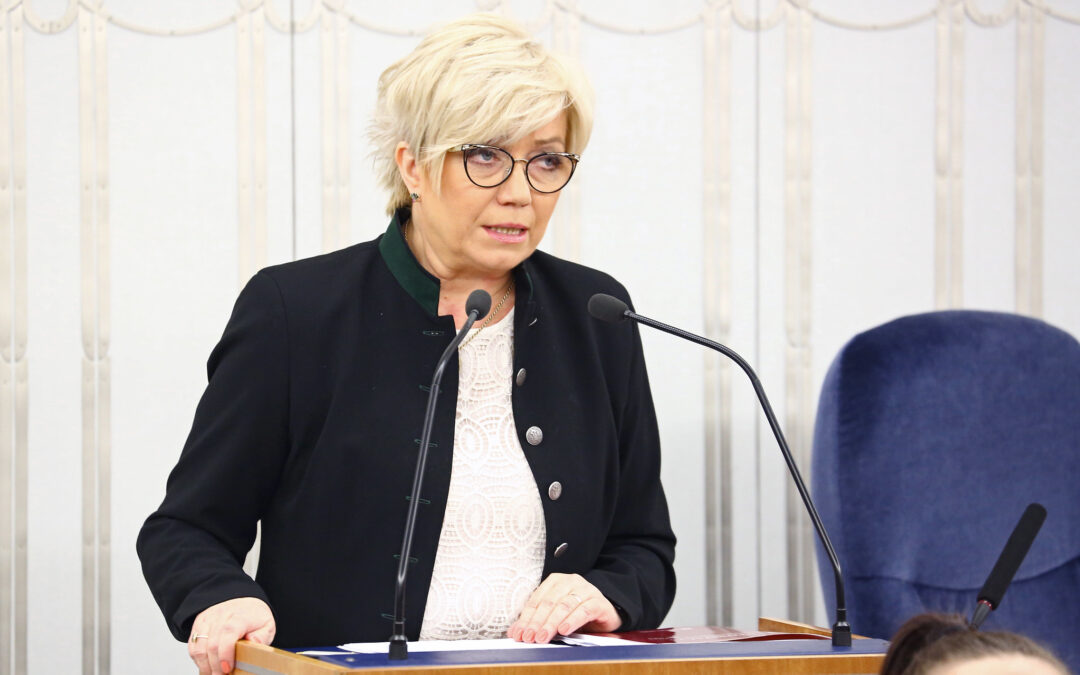The head of Poland’s Constitutional Tribunal (TK) has criticised the European Commission’s complaint to the European Court of Justice (CJEU) over her tribunal’s rulings on the supremacy of Polish over European law, calling it “clearly unlawful”.
The tribunal’s chief justice, Julia Przyłębska, argued that the CJEU does not have the authority to judge the TK’s rulings, which, according to the Polish constitution, is “the court that has the last word”.
The European Commission’s complaint, filed with the CJEU last month, concerns two rulings issued by the TK – a body widely seen as being under the influence of Poland’s ruling Law and Justice (PiS) party – that found parts of EU law to be inconsistent with the Polish constitution. These rulings were used, among others, to justify Poland ignoring CJEU rulings.
For more on the @EU_Commission's case against Poland, which was announced in February, see our previous report https://t.co/DShAPKOBla
— Notes from Poland 🇵🇱 (@notesfrompoland) July 19, 2023
In an interview with state-run Polish Radio Trójka, Przyłębska argued that the TK rulings against which the European Commission complained referred to “matters to which the Polish state has reserved exclusivity” in the treaties with the EU.
“The CJEU does not have the power of jurisdiction to decide cases, to evaluate decisions of the Constitutional Tribunal,” she said, adding that already in 2005, a year after Poland joined the EU, the tribunal found that it is “the court which has the last word” in jurisdictional disputes with European courts.
Przyłębska pointed out that the Polish constitution is “the supreme law of the republic”, and therefore it is the TK that undertakes this “final evaluation of the laws, including those related to the functioning of Poland in European structures.”
The first of the two rulings that the European Commission complained against, passed in July 2021, concerned Warsaw’s long-running dispute with Brussels over the disciplinary system for judges, with the TK finding that the CJEU’s rulings on the Polish judiciary system violated the Polish constitution.
The second ruling, issued in October 2021, again found parts of European law to be inconsistent with the Polish constitution, which the TK ruled takes precedence over them. Many experts warned at the time that it was a step towards the effective departure of Poland from the EU legal order.
“We are not saying that we expect more, we are not questioning Poland’s membership in the EU, we are not questioning the treaties as such, but we are saying that these treaties should be fulfilled in accordance with their wording,” Przyłębska said. “So if Poland has excluded certain areas from the authority of the European Union, it cannot be so that the EU appropriates them, in various forms.”
Poland's top court has found parts of EU law to be inconsistent with the Polish constitution, which takes precedence over them.
The ruling marks a step towards "legal Polexit", warn experts. But the government says it will stop the EU "usurping" powers https://t.co/xAlMfcJ9MT
— Notes from Poland 🇵🇱 (@notesfrompoland) October 7, 2021
The European Commission, however, disagrees with this interpretation, saying that the TK’s rulings “directly challenged the primacy of EU law and the provisions of the EU treaties”. In the past, it also expressed “serious doubts on the independence and impartiality” of the TK, which it “considers no longer meets the requirements of a tribunal previously established by law”.
Rulings by both Polish and European courts have found that the TK – whose chief justice, Julia Przyłębska, is a close associate of PiS chairman Jarosław Kaczyński and which contains illegitimately appointed judges – in its current form is not a lawfully established body.

Notes from Poland is run by a small editorial team and published by an independent, non-profit foundation that is funded through donations from our readers. We cannot do what we do without your support.
Main image credit: Senat RP / flickr.com (under CC BY-NC-ND 2.0)

Alicja Ptak is deputy editor-in-chief of Notes from Poland and a multimedia journalist. She has written for Clean Energy Wire and The Times, and she hosts her own podcast, The Warsaw Wire, on Poland’s economy and energy sector. She previously worked for Reuters.



















